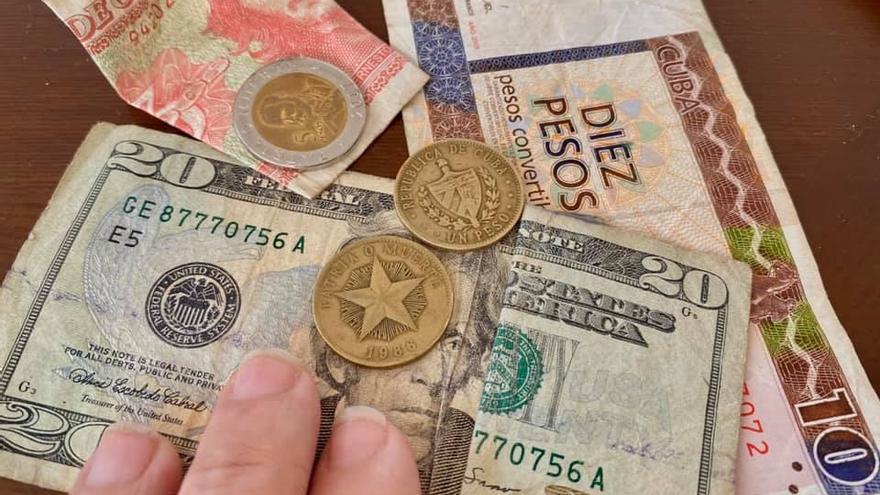
14ymedio, Reinaldo Escobar, Havana, July 16, 2020 – in the midst of a growing shortage in Cuban markets, the Government has decided to increase the distance between consumers and merchandise, improving the capacity to buy for holders of debit cards that can only be nourished with foreign currency. This commercial modality started at the end of last year for the sale of household appliances and auto parts, but now it’s being applied to food and personal hygiene and cleaning products.
The reason for this “partial dollarization” of commercial activity is that despite its name, the CUC (Cuban convertible peso) is not a convertible currency in international markets. It doesn’t make sense for the State to buy merchandise abroad in euros, yen or dollars to sell it later in the internal market in exchange for a piece of paper that has no real value and can’t be exchanged off the Island for any other currency.
Monetary unification has been announced many times, only to be postponed. As of yesterday, the Cuban peso (CUP), with which salaries are paid, won’t inspire envy, and the chavito (slang for the Cuban convertible peso) is now humiliated. What is valuable for real life will be the currency that is truly convertible: dollars, euros, yen or crowns. It’s not important that customers can’t get their hands on it; it’s enough that an electronic device can read the card and verify that the value is there.
In the absence of a political explanation that justifies this measure, it will undoubtedly be supported with reasons related to the restrictions imposed by the U.S. on Cuba, and with the infallible argument that what is collected will swell State funds in order to maintain social benefits. So a privileged minority that has access to foreign currency will finance a deprived majority.
When Fidel Castro introduced the dollar into the economy, he already accepted foreign investment and authorized self-employment, arguing that he was doing it to save the Revolution’s achievements.
Almost three decades later, it should be stated that, more than “saved,” these achievements only survived, at a high price and a highly regrettable standard. At this point, it’s not possible to go back to repeating the same argument.
Among the foreseeable consequences of this risky step, salaries will be farther away from being the natural support of the family economy, since almost everyone who has access to the debit cards won’t be part of the work force. This isn’t money earned “with the sweat of the workers,” but rather received as a handout or gift from the exterior.
The already growing social inequality will now extend to a highly sensitive sector: nutrition. What they’re going to sell in these stores aren’t “delicacies” but rather products of primary need, for which there’s a pressing demand.
What are they going to tell the kids of someone employed by the State when they ask why some of their classmates bring food to school for snacks that they can’t get?
Despite what is established in the Cuban Concept of the Social and Economic Model, in the Communist Party guidelines and in Article 65 of the Constitution, the new rule now won’t be “to each according to his work” but rather to each according to their relatives or friends abroad who are ready to send remittances. As a result, no one will now have the same enthusiasm for “the common work that provides justice to all,” but will strive to improve their personal relationships.
The dollarization of one indispensable part of retail commerce isn’t in itself bad news. It’s almost a blessing that this has been established by the present authorities, so that there won’t be leftist criticism of those who, after a foreseeable change, propose that everything be dollarized. In this sense they are already including other “advances,” like the elimination of workers’ dining rooms, the closure of Schools in the Countryside or the elimination of illegal gratuities.
The defect in this measure is its incoherence in relation to the other economic, social and political factors. It’s enough to remember that point 19 of the macroeconomic policies of the Party guidelines proposes “consolidating the pecuniary functions of the Cuban peso, with the goal of strengthening its role and preponderance in the monetary and financial system of the country.” Can undercutting the ability of the Cuban peso to convert itself into goods and services be a way of strengthening it?
When complaints about poverty are combated by arguing the inviolability of principles, believers close their mouths and forge ahead; but something will have to happen when principles are trampled underfoot and the suffering increases.
*Translator’s note: CIMEX is a State-owned Import-Export corporation. Its financial branch, FICIMEX, controls credit card transactions in Cuba and remittance wire transfers from other countries.
Translated by Regina Anavy
______________
COLLABORATE WITH OUR WORK: The 14ymedio team is committed to practicing serious journalism that reflects Cuba’s reality in all its depth. Thank you for joining us on this long journey. We invite you to continue supporting us by becoming a member of 14ymedio now. Together we can continue transforming journalism in Cuba.
